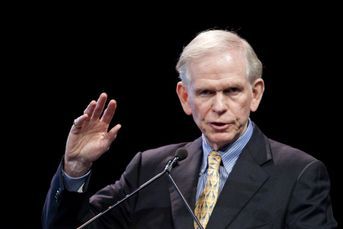Wall Street attracts chop shops 20 years after ‘Wolf’
The Internet has changed the game but decades-old scripts still lure investors
When Paul Taboada ran Charles Morgan Securities Inc. at 120 Wall St., he set himself apart by wearing suits with the brokerage’s name stitched into the pinstripes.
He ran into trouble within a few years. A client was sent to jail in 2010 for a fraud prosecutors alleged Mr. Taboada facilitated. Customers complained about a fund he set up to invest in Facebook Inc. before it went public. That didn’t slow him down. He shut the firm amid an investigation by regulators and moved to Blackwall Capital Markets Inc. at 100 Wall St., where trainees call hundreds of strangers a day to pitch stocks.
“What Wall Street does is it affords the common man participation in deals the institutions are doing,” said Mr. Taboada, 49, who hasn’t been sanctioned in either matter.
Twenty years after Jordan Belfort and his Stratton Oakmont Inc. defrauded investors out of more than $200 million from its offices on Long Island — a story retold in the movie “The Wolf of Wall Street” — New York’s financial district has become a hub for veterans of defunct boiler rooms who use decades-old scripts to pressure investors into speculative trades, more than 40 current and former brokers said in interviews.
“They’re preying on the few people who still answer a landline phone,” said Joshua Brown, chief executive officer of Ritholtz Wealth Management in New York, whose 2012 book “Backstage Wall Street” described the sales tactics. “You pitch 50 guys a stock, and you pitch 50 guys another. If one goes higher, you go back to that pile.”
CHOP SHOPS
There are at least 15 chop shops, as brokers call them, within a few blocks of the New York Stock Exchange, even after one of the biggest, John Thomas Financial Inc. of 14 Wall St., closed last year. Except for Deutsche Bank AG at 60 Wall St., big banks moved their headquarters from the area’s cobblestone streets to more spacious offices elsewhere in Manhattan.
Three brokerages that use cold-calling are at 40 Wall St., the 72-story skyscraper built in the 1920s for the Manhattan Company, a predecessor of JPMorgan Chase & Co. founded by Aaron Burr, the third vice president of the U.S. The tower, now called the Trump Building, also houses two securities firms that are under investigation.
Sean Scott, 27, said he made $20,000 in a good month pitching investors over the phone at one of the brokerages, John Carris Investments, on the 17th floor.
“A broker can make a hell of a lot of money just making a few trades here, a few trades there,” said Mr. Scott, who worked there in 2011 and is now an adviser at Bank of America Corp.’s Merrill Lynch in Florida.
On a recent afternoon, a current Carris employee pointed out a rival from 46th-floor brokerage Aegis Capital Corp. taking a cigarette break in front of the tower. The broker, nicknamed “The Platypus” for his splay-footed waddle and untucked shirts, turned to take a long look at a blonde woman walking by.
There’s nothing illegal about cold-calling, and all the chop shops employ at least some brokers with clean records. The boiler-room operators of the 1990s mostly got into trouble for having their brokers unload penny stocks they secretly owned on unsuspecting investors. The schemes were so profitable that organizers could afford to pay 20% commissions.
No one’s paying that much anymore. Trainees get $250 or $300 a week, and the brokers said they sometimes go months without selling anything.
Today, computerized records make it easier for regulators to unravel fraud. The federal do-not-call list, established in 2003, has both limited phone solicitation and made it less socially acceptable. Most people know they can trade stocks online for about $10 and want to look up a brokerage on Google before sending money, the brokers said.
‘DIALING NONSTOP’
“Stratton Oakmont was before the Internet,” Danny Porush, the Stratton president who served about two years in prison for securities fraud, said in a phone interview last year. “Things are going to be much tougher now when someone mentions a stock and two clicks away you find out everything.”
That doesn’t stop brokers from trying. Armed with only the names of business owners on index cards, trainees call, tout their Wall Street addresses and say their boss will call back with one good stock tip. Hundreds of people hang up for each one willing to listen to the pitch, brokers said.
“There could be days when you’re dialing nonstop, and nothing,” said Jorge Ferreira, 40, a broker at Blackwall.
The brokers said they start by recommending a well-known stock. A few months later, they pressure investors to sell and switch into other shares, charging commissions of about 3% on each trade, or to buy private deals which generate bigger fees, the brokers said.
“You would never see a larger firm do that,” said Mr. Brown, the Ritholtz CEO.
One 18-year veteran said his clients always lose eventually, forcing him to start cold-calling again.
The lines the chop shops use haven’t been updated since many of them were featured in the 2000 film “Boiler Room,” brokers said. One script, obtained from a former broker at Meyers Associates, recommends telling a man who says he has to ask his wife before trading to buy a fur coat with the profits instead.
“Let’s not kid each other, I didn’t just pick up the phone book and dial your number,” the script reads. “Opportunities like this do not come along every day.”
Bruce Meyers, CEO of the brokerage, didn’t respond to messages seeking comment.
ERECTILE DYSFUNCTION
Representatives of Meyers, Carris and Aegis are among those who mingle with executives and investors at free lunches organized by a club called the Harvard Investors Group. Brokers giggled and retirees picked at chicken as an executive from Apricus Biosciences Inc. (APRI) talked up an erectile-dysfunction cream at a meeting in November at the 155-year-old Down Town Association on Pine Street. Dan Killian, the group’s organizer, said the stock sounded like it had potential.
“Hello, ladies and gentlemen, sometimes there are opportunities,” Mr. Killian told the gathering of about 40.
Mr. Killian said his group isn’t connected with Harvard University and doesn’t pretend to be. David Pitts, an Apricus spokesman, said the company regularly speaks with institutional investors. Michael Ference, a lawyer for Aegis, said only three of the firm’s brokers at 40 Wall St. engage in what he called prospecting. Carris founder George Carris, who’s fighting Financial Industry Regulatory Authority Inc. allegations that he used the brokerage’s money to cover $590,000 of personal expenses, including $10,554 at a tattoo parlor, didn’t reply to messages.
Payday at downtown brokerages is typically the 15th of the month. One former Blackwall broker said in good times he’d call his cocaine dealer and head for Atlantic City. An ex-trainee at Meyers said his boss would give him $100 to run across Broadway to cash checks for thousands of dollars. Attendance is poor on the 16th, brokers said.
“There’s a saying on the Street: ‘Go big or go home,’” Edgar Repko, a veteran of downtown brokerages, said in an interview at Nassau Bar, a dimly lit broker hangout six blocks from Wall Street where women in bikinis pour shots.
Mr. Repko, 30, said at his peak he was making more than $15,000 a month and spending most of it on painkillers. He said he got hooked after a back injury. Three months after losing his last job as a broker in 2012, he was arrested trying to break into a Newburgh, N.Y., pharmacy wearing a Mike Tyson mask, according to police records.
Kevin Chen, Blackwall’s 31-year-old CEO, said he’s teaching the principles of value investing to young kids who wouldn’t otherwise get a shot on Wall Street. He said Blackwall does its best to make money for its clients.
“What we’re doing, or what is done on the Street between some of these small firms, it’s not illegal,” Mr. Chen said. He said Mr. Taboada, his employee who used to run Charles Morgan, is a savvy broker and that he hasn’t dug deeply into his background.
Mr. Taboada projects an image of success, according to eight people who worked for him at Charles Morgan. He would twirl his pinky ring as he told new hires about his income and condo at the Ritz-Carlton, the ex-brokers said. Mr. Taboada said one day they would all wear suits with the firm’s name in pinstripes, a former employee said.
Mr. Taboada kept a supply of soap-filled sponges made by Spongetech Delivery Systems Inc. in the office, three of the people said. He told them he made millions of dollars trading shares of the company, whose chief operating officer pleaded guilty to securities fraud after it went bankrupt.
SHAM COMPANY
In his 24-year career, Mr. Taboada has seen a lot. Four of his previous employers were kicked out of the securities business, according to regulatory records.
The heads of his first two employers were barred from selling stocks for fraudulent markups, and at least two salesmen from another firm where he worked served time in prison for securities fraud, according to court records.
Hornblower & Weeks Inc., where Mr. Taboada worked from 1999 to 2002, was expelled from the securities business after Mr. Taboada allegedly published a misleading report for one of his investment-banking clients. The CEO of that firm, GlobeTel Communications Corp., was jailed for fraud in 2010, according to court documents. Mr. Taboada aided the scheme by setting up a sham company, prosecutors said in a filing. He wasn’t charged.
“The absence of charges speaks for itself,” said Michael Bachner, a lawyer for Mr. Taboada.
Now, he has a new pitch: He offers a way to buy into technology companies before they go public. He says he’s a professional who gives investors ideas and access they couldn’t get on their own.
“I’m a strong believer that just because you can buy dental equipment on the Internet doesn’t mean you should drill your own teeth,” Mr. Taboada said.
During the hype surrounding Facebook’s 2012 initial public offering, Charles Morgan raised millions of dollars with a pitch that it could get investors shares at certain prices through its fund, four of the people said. Clients were angry when they learned they had paid as much as $10 a share more than they were told, the people said.
Mr. Taboada closed his company and moved across the street to Blackwall after Finra started investigating him in 2012, according to the organization’s records, which don’t show what the probe is about. Three former Charles Morgan brokers said they were called in for interviews by Finra to talk about Mr. Taboada and the Facebook fund.
PROSTITUTION ARREST
Mr. Taboada hasn’t been accused of wrongdoing in connection with the Facebook fund. Nancy Condon, a Finra spokeswoman, said the regulator wouldn’t talk about open investigations. Mr. Taboada and his lawyer didn’t respond to questions about the matter.
Mr. Taboada said in an interview that he doesn’t make cold calls and that people may be making up things about him. He said his office at Charles Morgan had only a few Spongetech sponges.
“Your facts are totally skewered,” he said.
Neither the Finra investigation nor a 2012 arrest for patronizing a prostitute have slowed him down. He pleaded guilty and paid a $250 fine, court records show.
This month Mr. Taboada said in a regulatory filing that he has raised $9.5 million for Mogo Industries, a fund he created to invest in Palantir Technologies Inc. A lawyer for Palantir, a Silicon Valley data-analysis firm co-founded by venture capitalist Peter Thiel, didn’t return phone calls.
(Bloomberg News)
Learn more about reprints and licensing for this article.








